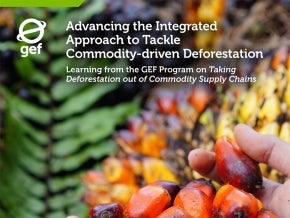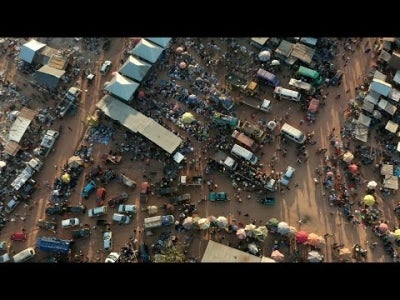
After Hurricane Isidore hit the west coast of Mexico in 2002 – at the time the second-most intense Atlantic hurricane to have ever struck there - local women got together to rectify the devastation, starting with a water committee.
Their work started as a recovery programme, and has since blossomed into a comprehensive project for resilient guardianship of the ecosystems that give life and livelihood.
Many hands make light work
With funding from the Gonzalo Río Arronte Foundation, and administered and implemented by UNDP Mexico, the Community Committee for Disaster Risk Reduction supports local water management solutions and works with regional governance to monitor and prevent the pollution of aquifers from agro-industrial waste.
In addition to water management, the women from the Community Committee for Disaster Risk Reduction also harvest a local variety of oregano (Lippia Graveolens) which provides main family income and requires careful forest management and conservation.
The women’s cooperative is now supported by the UNDP implemented Small Grants Programme (SGP) of the Global Environment Facility, to design a strategy to sustainably manage the oregano forest patches, and add value to the product.
"Our entire life is from the jungle. It’s our medicine, our houses, our food, our everything. We could not live without nature." Manuela Poot Chuc, President of the Community Committee for Disaster Risk Reduction
Liquid gold
The sudzal farmers believe that organic beekeepers are key guardians of the forest.
Each hive supports the sustainable management of more than 70 hectares, through the pollination of cash crops and wild/endemic plants; through the hives’ integral role in preserving biodiversity, wildlife habitats, healthy food chains, and the native fauna that depend on them; and by supporting sustainable livelihoods for locals.
As of 2015, Mexico is the fourth-largest honey producer in the world by exported value, with over USD$150m in honey exports per annum.
Symbiotic relationship
Also affected by Hurricane Isidore in 2002, and subsequent hurricanes to hit the Yucatán Peninsula, farmers in the Sudzal Municipality (located roughly 75 km east of the city of Mérida) were looking for more robust ways to live in harmony with the land.
With SGP support and implemented by UNDP, the Sudzal Beekeeping Cooperative received a grant to contribute to sustain organic beekeeping on the Cooperative’s communally-farmed land, which sustains 11 beekeepers in the cooperative – and in turn reciprocally supports hundreds of hectares of forest.
To ensure that this vital, sustainable, environment-preserving income stream is viable in future, SGP and PMR are supporting fair trade and organic beekeeping.
The EDUCE Cooperative, which works as a fair intermediary to connect with international markets, is an exemplar of the utility in connecting small-scale specialty beekeepers to lucrative international markets.
"We take care of the bees and the bees take care of us." Luis Manuel, member of the Sudzal Beekeeping Cooperative
In this sense, beekeeping serves as responsible ecosystem management, improving lives for wild flora and fauna, the humans that directly depend on them, and replenishing seed stocks for future generations.
Eating the woods
The project’s conservation and improvement of 942.48 hectares of forest through management practices and tree planting also helps to mitigate climate change by increasing carbon sequestration, improving soils, and promoting the increase of biodiversity and ecosystem productivity.
Floral species of interest to beekeepers have additional positive effects: protecting endemic species, collecting and dispersing seeds, and diminishing competition by invasive species.
‘You can taste the pollen and the sweetness tastes full of life. … This honey is a mix of all the flowers of the jungle. We are not afraid of the bees. Mayans have been beekeepers for thousands of years. .. We eat the woods’, Martiniano Yan Santos, member of the Sudzal Beekeeping Cooperative.
Buzzing with activity
A second nearby cooperative - Flor de Tajonal SC de RL - also received an SGP grant to transition from conventional to organic beekeeping.
Activities supported by the grant included:
- organic certification for the Society’s production system, including 80% of its initial inventory of hives;
- the cultivation of organic wholesalers;
- an ongoing contingency programme to manage risks from natural disasters such as hurricanes and forest fires; and
- an integrated group of women trained in honey processing and value-added production of goods such as sweets, soaps, creams, ointments, and syrups.
Guardians of the seeds
Following Hurricane Isidore in 2002, farmers lost thousands of square kilometres of maize, along with their seeds.
In response, with UNDP support, farmers launched a seed fair to share, trade, and disperse native seeds back across decimated lands. The first such seed fair was held in 2003, and has since been reproduced at approximately 30 sites across Mexico.
Squash, corn, and beans: 4,500 years of domestication
One group, the Misioneros AC - a group of Mayan farmers that use the traditional intercropping farming system (milpa), applied for and received an SGP grant to promote sustainable development and improve conservation efforts in the Southern Microregion of Yucatan.
As part of the project’s activities, these Mayan farmers enhanced their milpa agricultural intercropping system - rescuing native seeds – best adapted to local soils - as a way to adapt to climate change and defend their territories.
This innovative, resourceful, sustainable spirit is perhaps exemplified by the Trinity of the Milpa – squash, corn, and beans.
‘The three together, to grow and to eat, is the perfect complement. The beauty of 4,500 year of domestication together’. – Sébastien Proust, Coordinador Nacional del Programa de Pequeñas Donaciones del FMAM, Programa de las Naciones Unidas para el Desarrollo
A movement is brewing
One means of nurturing the symbiosis between healthy local soils and native seeds is via homemade local fertilisers.
Locals sniff out a particular forest soil bacteria and then cultivate the microbial community, supplementing its growth with sugar/molasses and wheat bran. After two months of brewing – one anaerobic, one aerobic - the resulting slurry is a potent source of soil nutrients.
It’s an agroecological revolution.
“With these techniques, there is no need to cut new patches of forest, we are getting the bounty and the fertility of the forest and harnessing it, We’re finding the fertility of the jungle and cultivating it.” Humberto Chable, Mayan farmer and member of Misioneros AC.
A resilient future
Biological diversity underpins healthy ecosystem functioning and the provision of ecosystem services like clean air and water; it contributes to local livelihoods and economic development, and is essential to achieving the Agenda 2030 and its Sustainable Development Goals (SDGs).
The many hands working on these projects are advancing Mexico’s efforts on SDG 1 on poverty, SDG 2 on zero hunger, SDG 3 on good health and well-being, SDG 13 on climate action and SDG 15 on life on land among others.
For more information on the work of UNDP Mexico, please visit here.
The story was originally published by UNDP.


